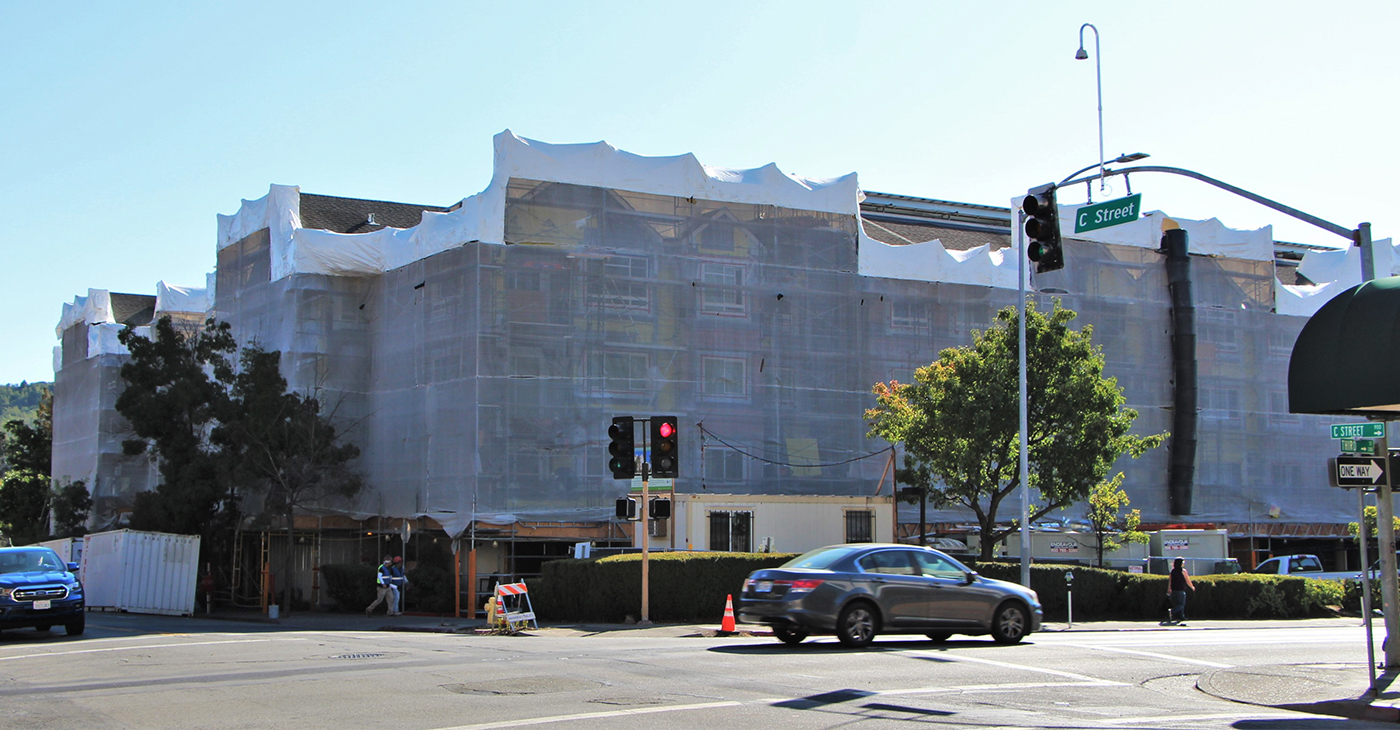City Government
Money Available for Affordable Housing Development
More money is available for affordable housing developers to create new affordable homes in Marin County and preserve existing affordable units. This year, the County of Marin is leveraging several local, state and federal funding sources and issuing a single online application for affordable housing developers to bid for a portion of the $5 million available.

March 17 deadline to apply for over $5 million in funding; March 1 virtual meeting set to assist applicants
By Molly Kron
More money is available for affordable housing developers to create new affordable homes in Marin County and preserve existing affordable units.
This year, the County of Marin is leveraging several local, state and federal funding sources and issuing a single online application for affordable housing developers to bid for a portion of the $5 million available. The Notice of Funding Availability (NOFA) guidelines provide more details about the different types of funding and criteria for project eligibility.
Streamlining the application and allocation process supports developers who face high housing production costs and helps address the chronic shortage of affordable homes in Marin.
The available funding includes roughly $2.3 million in County Affordable Housing Funds (including a one-for-one match from the State Permanent Local Housing Allocation), $2.4 million in new federal funds from the American Rescue Plan, and $600,000 in federal Community Development Block Grant funds specific to housing projects.
The funds can be used for acquisition, rehabilitation, and new construction projects, although eligibility differs among the funding sources.
To address questions from potential applicants, County staff will host a virtual workshop at 1 p.m. Wednesday, March 1. Registration is open on the County’s Affordable Housing webpage. Around June, staff will present funding recommendations to the Board of Supervisors for final approval.
Marin has some of the highest home prices and development costs in the country. The median local price for a single-family detached home has hovered around $1.5 million in recent years, and typical rents range from $2,500 to $3,400. During the COVID-19 pandemic, there has been increased concern about homelessness in Marin and discussions about how to stabilize renters and expand housing choices
Well before the public health emergency, the Marin County Board of Supervisors made the preservation of affordable housing and displacement prevention top priorities as more and more Marin residents expressed concern about being priced out of the county because of high rents and mortgages.
The County’s Housing & Federal Grants Division, housed within the Community Development Agency, seeks to preserve and expand the range and supply of adequate, accessible and affordable housing through housing policies, regulations and programs. The Board and CDA staff work in tandem to increase the local stock of affordable housing, thereby enhancing socioeconomic balance in local communities.
Learn more by exploring the Super-NOFA and funding application on the County’s Affordable Housing webpage. Questions may be directed to Housing staff by email (affordablehousing@marincounty.org) or by phone at (415) 473-7309.
Molly Kron is a senior planner for the Housing and Federal Grants Division in the Marin County Community Development Agency.
Activism
Oakland Post: Week of July 24 – 30, 2024
The printed Weekly Edition of the Oakland Post: Week of July 24 – 30, 2024

To enlarge your view of this issue, use the slider, magnifying glass icon or full page icon in the lower right corner of the browser window. ![]()
Activism
Oakland Post: Week of July 17 -23, 2024
The printed Weekly Edition of the Oakland Post: Week of July 17 -23, 2024

To enlarge your view of this issue, use the slider, magnifying glass icon or full page icon in the lower right corner of the browser window. ![]()
Antonio Ray Harvey
Lawmakers Incensed by ‘Watering Down’ of Language in Child Sex Solicitation Bill
After an emotional hearing on July 2, the Assembly Public Safety Committee voted to advance Senate Bill (SB) 1414 with an 8-0 vote. The legislation is an anti-sex-trafficking measure designed to increase penalties for those who purchase sex from children, SB 1414, co- authored by Senators Shannon Grove (R-Bakersfield), Anna Caballero (D-Merced) and Senator Susan Rubio (D-Baldwin Park), will be reviewed by the Assembly Appropriations Committee after the Legislature break ends on Aug. 5.

By Antonio Ray Harvey
California Black Media
After an emotional hearing on July 2, the Assembly Public Safety Committee voted to advance Senate Bill (SB) 1414 with an 8-0 vote. The legislation is an anti-sex-trafficking measure designed to increase penalties for those who purchase sex from children,
SB 1414, co- authored by Senators Shannon Grove (R-Bakersfield), Anna Caballero (D-Merced) and Senator Susan Rubio (D-Baldwin Park), will be reviewed by the Assembly Appropriations Committee after the Legislature break ends on Aug. 5.
The legislation has received bipartisan support. However, “critical amendments” were removed, Grove said. She is not satisfied with the language currently in the bill and is pressing members of the Assembly Public Safety Committee to allow key provisions to be restored.
“I am disappointed that they didn’t accept the amendments for all minors to be protected under felony convictions,” Grove said after the committee’s vote.
“I am not going to give up fighting for those 16- and 17-year-olds – and all minors,” Grove stated. “Now, the district attorneys would have to prove two crimes: that they were bought and sold in order to go back to the perpetrator (trafficker) who initiated the whole process.”
SB 1414 made it off the Senate floor with a 36-0 bipartisan vote on May 23. Before the floor vote in the Senate, the Senate Public Safety Committee amended SB 1414, weakening protections for children ages 16 and 17, Grove said.
The committee’s amendments included charging violators who purchase children 15 and under for sex as ‘wobblers’ (crimes that can be punished as a felony or misdemeanor). According to the current language of the bill, solicitation of a 16- and 17-year-old child is only punishable as a misdemeanor. The second amendment to the bill calls for the felony charge to only carry possible jail time — not time in prison.
Grove and her supporters’ other concern is that a third amendment to SB 1414 states that only perpetrators with a previous conviction of buying sex from a child 15 or under, on the second offense and with over a 10-year age gap of the victim, must register as a Tier 1 sex offender.
Dr. Stephany Powell, a retired Los Angeles Police Department sergeant who has over 30 years of sexual exploitation and trafficking experience gained through law enforcement, testified in front of the Assembly Public Safety Committee.
“First of all, there’s no way in the world that (these amendments) are protecting a 16- or 17-year-old,” said Powell, who now assists victims of human trafficking. “Just by the age alone, they are considered to be a victim of human trafficking. That’s your proof right there.”
Assemblymember Kevin McCarty (D-Sacramento), chair of the Public Safety Committee and a member of the California Legislative Black Caucus (CLBC), told Grove that he supports SB 1414 and commended her efforts to bring “more accountability to the sex trade.”
McCarty said he is willing to make SB 1414 “stronger,” but he is not willing to allow Grove to buck the rules of the Legislature to push her amendments through.
“That’s not on the table. As the rules, you know, we can’t go change that,” McCarty said of Grove’s amendments request.
On June 2, Anne Irwin, the founder and director of Smart Justice California, emailed California Black Media (CBM) a statement responding to SB 1414. Smart Justice sides with the amendments made by the Democrats in the Senate and the Assembly.
“With the recently adopted amendments, SB 1414 now represents a smart policy solution that prioritizes the safety and well-being of all minors,” Irwin stated. “By allowing felony prosecutions for solicitation of 16- and 17-year-olds when there is evidence of human trafficking, lawmakers have further improved the bill – which was originally overly broad and would have had harmful unintended consequences.”
-

 Arts and Culture3 weeks ago
Arts and Culture3 weeks agoRooted in Tradition: The Intricate History of Black Hair Braiding
-

 Bay Area4 weeks ago
Bay Area4 weeks ago“I Will Not Be Bullied,” Says Oakland Mayor Sheng Thao
-

 Bay Area2 weeks ago
Bay Area2 weeks agoPG&E Increases Rates While Bay Area Households Are Struggling to Stay Afloat
-

 Business3 weeks ago
Business3 weeks agoGov Newsom: Raising Fast Food Minimum Wage to $20 Pays Off as Jobs Multiply in Industry
-

 Activism4 weeks ago
Activism4 weeks agoOpponents of Mayor Sheng Thao Are Calling on Her to Resign Following FBI Raid
-

 Community1 week ago
Community1 week agoHundreds Come to Jehovah’s Witnesses’ Assembly Hall for Three-Day Program of ‘Good News’ in Fremont
-

 Bay Area2 weeks ago
Bay Area2 weeks agoJuneteenth Mass Shooting Suspect Charge with Multiple Counts of Felony Assault by Alameda County DA Pamela Price
-

 Activism4 weeks ago
Activism4 weeks agoOakland Coliseum Sale to AASEG: A Model for Community Development and Inclusion



















































